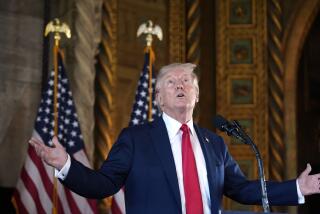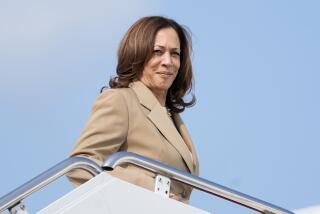Tsongas Showing Signs of Winning Over N.H. Voters : Politics: Polls indicate the candidate is finding an audience. But some question his strength in other states.
- Share via
MANCHESTER, N. H. — Democratic presidential contender Paul E. Tsongas enjoys telling crowds in New Hampshire that he lacks charisma, is plain-looking and is sometimes dull. But these days he is not lacking in self-confidence.
While officials in some other primary campaigns worried last week that their candidates might be stalling or falling in the polls, the former Massachusetts senator was buoyed by signs that he is still connecting with voters. Tsongas even seemed to be winning over liberal Democrats, according to one poll--despite a pro-business message with features that many would consider conservative.
“A year from now, we’ll be in the White House,” Tsongas promised voters at a campaign stop in Hudson, N. H., last week.
But amid favorable developments, there were signs that the thinly financed campaign may face organizational difficulties when the focus moves to other states after the Feb. 18 New Hampshire primary. Tsongas has raised less than a third as much money as the fund-raising leader, Arkansas Gov. Bill Clinton. And as Tsongas gains in the polls, his rivals are less willing to praise his ideas, as they did earlier in the campaign.
Tsongas himself noted during a debate last Friday that the kind words have stopped. “Now I’ve moved up in the polls, and I’m Darth Vader,” he said.
Despite continuing volatility in the polls, Tsongas remains in a relatively strong--and stable--position. In a University of New Hampshire poll of likely Democratic voters taken Jan. 27, Tsongas received support from 25% of the respondents, compared to Clinton’s 30%. Another Jan. 27 poll taken for the Boston Globe gave Tsongas 21% to Clinton’s 30%. A third poll, taken from Jan. 30 to Feb. 1 by Manchester’s American Research Group, gave him 23% to Clinton’s 38%. All these polls have a margin of error of about 5 percentage points in either direction.
The favorable polls have surprised many political analysts, who thought the droopy-eyed, 50-year-old, lawyer from Lowell, Mass., could not convince voters that he is presidential material. “I always thought Tsongas would be strongest on the day that he announced,” said Richard Winters, professor of government at Dartmouth College in Hanover, N. H. “This is a surprise to me.”
American Research Group’s polls suggest that one important change for Tsongas has been a decline in his unfavorable rating: It dropped from 47% last spring, after his April 30 announcement, to 17% in late January.
Dick Bennett, president of the opinion research company, interprets this as a sign that some Democrats no longer dismiss Tsongas as an unelectable “Greek from Massachusetts,” in the mold of 1988 Democratic nominee Michael S. Dukakis. Respondents cited Tsongas’ economic message as the reason for their support, which Bennett interprets as a sign that the voters have tuned in to what Tsongas is saying.
The indication that Tsongas has been attracting liberals came in the poll from the University of New Hampshire. The survey showed Tsongas outpolling Clinton, 30% to 20%, among Democrats who describe themselves as liberal. Tsongas also did better than Clinton among respondents who earn more than $70,000 a year and have a college education. Among moderate Democrats, however, Clinton got 35% to Tsongas’ 22%, and among conservatives, Clinton held an advantage of 36% to 21%.
At a campaign stop for Iowa Sen. Tom Harkin in Peterborough, N. H., last week, Carol Bramblett said she could understand the interest in Tsongas.
“He’s not your politician who will say anything,” said Bramblett, a former teacher who described herself as a liberal Democrat. “People have taken another look at him, and he’s getting respect around here.”
But Bramblett, who said she is trying to choose between Tsongas and Harkin, added that she was still unsure whether enough Americans will consider Tsongas presidential to give him a chance at winning.
Tsongas has not let his rising prospects change him. In recent days, he has been tireless in advocating proposals the public might not like--including higher gas taxes, tough deficit-reduction measures, nuclear power and longer school days for youngsters.
At the Hudson, N. H., home of a family that has struggled financially after their daughter’s auto accident, he warned against a government takeover of health care programs that might bankrupt the system and turn Americans against each other.
“My greatest fear on health care is cost--if it blows up, you’re going to pit people in this country against other people,” he told the family.
During Friday’s debate, Tsongas was ready when moderator Robert MacNeil asked the candidates about criticism that they were offering only “ouchless, painless” solutions.
“If you want Santa Claus, I’m not your candidate,” Tsongas said.
Tsongas’ warning against government-run health care and the “Twinkie economics” of a middle-class tax cut has recently earned him praise in national newspaper articles, which Tsongas frequently cites.
Tsongas will need more than these plaudits when he tries to convert what he hopes will be a strong New Hampshire showing into the money and organization he will need in subsequent primaries.
Clinton, the money leader, raised $3.3 million by the end of 1991. Tsongas, by contrast, has raised $1.06 million. In fact, the $556,444 that Tsongas has been certified to receive in federal matching funds is less than authorized for Clinton, Harkin, Nebraska Sen. Bob Kerrey and even Lenora Fulani, candidate of the New Alliance Party, who is to receive $763,928.
Analysts have predicted that Tsongas will do well in neighboring Maine, which holds a caucus on Feb. 23. Tsongas campaign officials say that after New Hampshire, the focus will be on Washington state, which has a March 3 caucus, along with Colorado and Maryland, which hold primaries on that day.
His supporters hope to give the campaign enough momentum in the early contests to survive Super Tuesday on March 10, when about 800 delegates will be at stake in 11 states. Clinton is expected to have a strong edge because the bulk of the delegates will come from the South.
But Tsongas’ name probably will not even be on the ballot in one of those states, Oklahoma. Last week, his campaign workers failed to come up with a certified check for $2,500 and a notarized copy of Tsongas’ signature by the filing deadline, putting 45 delegates out of reach. Tsongas says he will sue to try to reverse the decision.
Peggy Connolly, Tsongas’ press secretary, acknowledges that the campaign “doesn’t have the resources to be (as) active as we would like in every state.” But she says the campaign has laid the groundwork to mobilize quickly if a strong New Hampshire showing brings in campaign money and volunteer support.
“The Tsongas fund-raising base has yet to be tapped,” she said. “Many people are watching Feb. 18 very carefully.”
She says the campaign already has some staff organization in Maryland and Washington state and that it operates “to a limited degree” in Colorado. Tsongas himself says he has 600 volunteers in Maryland and calls his organization “better than anybody’s.”
But Democratic party officials in Maryland, Washington state and Maine say they have seen few signs of Tsongas’ campaign beyond several visits by the candidate himself.
Nathan Landow, Democratic state chairman in Maryland, said that Clinton has a “full-blown campaign organization” there and that and Harkin has undertaken a “major effort, with public endorsements, press conferences, fund raisers.” Tsongas “is not invisible, but the effort here is very limited.”
In an apparent confirmation of the fact that other campaigns now consider Tsongas a threat, Kerrey’s campaign manager, Tad Devine, predicted “real problems” for Tsongas when the race moves to other states. “If you’re not positioned well in this process, you’re going to have a real hard time running later on,” he said.
Kerrey himself was more blunt. “Tsongas isn’t going anywhere after New Hampshire,” he said.
Times staff writer Karen Tumulty in Manchester, N. H., contributed to this story.
More to Read
Get the L.A. Times Politics newsletter
Deeply reported insights into legislation, politics and policy from Sacramento, Washington and beyond. In your inbox twice per week.
You may occasionally receive promotional content from the Los Angeles Times.











